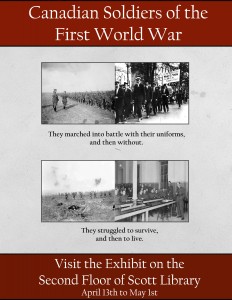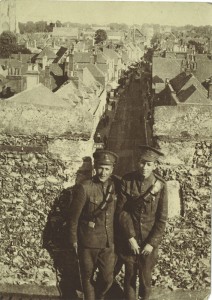 Exhibit: Canadian Soldiers of the First World War
Exhibit: Canadian Soldiers of the First World War
Author and curator: Ryan Targa
Location: Scott Library, Second Floor Atrium
13 April 2015 - 1 May 2015
The years between 2014 and 2018 mark the 100th year anniversary of the First World War. During this conflict the Great Powers of Europe contested one another for total supremacy, bringing with them people from the corners of the world. As a dominion of the British Empire, Canada was politically tied to the fate of Europe, thereby compelling the young country of 47 years to muster its forces and jump into the fray. By the end of the First World War, the Canadian Expeditionary Force had grown to approximately 620,000 personnel from an estimated population of 8,000,000 (though not all those who joined did so voluntarily).
First World War soldiers have acquired much significance in Canadian history and identity. As the popular belief goes, it was on the battlefields of the First World War that Canada distinguished itself on the international stage and helped pave the way towards national independence. It is also believed that the collective struggle of the war solidified a sense of national community. However the significance of the First World War as a moment of national triumph and formation has been largely created in retrospect of these events. During this 100th year anniversary, we should return to the past as closely as we can. We should not be content with what we already believe, but rather we should challenge our own perceptions and ask new questions such as, what did the war mean for the people and soldiers who fought it? If we succumb to our traditions like Remembrance Day and merely honour the sacrifices of soldiers, we miss an opportunity to learn from them. By forgetting their struggles beyond the battlefield, we are committing a great injustice.
The Canadian Soldiers of the First World War exhibit introduces a range of topics not often discussed in the public commemoration of First World War soldiers. First, the exhibit provokes the audience to question their common perceptions of the war by critiquing popular narratives which confine the experiences of Canadian soldiers. After providing background information and a general context of the war, the exhibit provides a glimpse of how Canadian soldiers were part of a wider social struggle against their own military command, as well as against the society they sacrificed everything to defend. The meaning of this more complicated history is not implicated in the exhibit. The meaning of the past will once again require our conclusions in the present. Yet the exhibit does have one implicit conclusion. By moving beyond common narratives of nationalist triumph, as well as the traditions of celebration and mourning, we may discover a world not so dissimilar to our own, one that is defined by its complications and the people who seek to shape its uncertain future.
Text by Ryan Targa
 Exhibit title: “I will need socks now so send a pair in every parcel.1” Letters from the Front
Exhibit title: “I will need socks now so send a pair in every parcel.1” Letters from the Front
Curator: Anna St.Onge
Digitization and transcriptions by: Joanna Chojnacka
Location: Scott Library, Third Floor
13 April – 1 May 2015
Scholar Martyn Lyons notes that the years 1914-1918 generated “…an absolutely diluvian outpouring [of letter-writing] that defied all attempts at administrative control. The war spawned a massive and possibly unique corpus of popular literature which could not be contained in spite of the attempts of postal censors and administrations.”2
The Archives can created a small complementary exhibit of correspondence from a soldier, Gordon Stepler, who served during the war. Reproductions of some of his correspondence from April 1917 and 1918 will be on display on the third floor exhibit case located outside the front doors of the archives.
In addition, digitized copies of Stepler's correspondence with his family is available online in our institutional repository, YUDL.
Researchers interested in historical documents related to WWI can view a list of archival holdings from the university archives available online.
For more information, contact the archives.
[1]Letter from Gordon Stepler to his mother 5 April 1917 from France. Dorothy Stepler fonds, F0107, ASC19588. Available at: https://digital.library.yorku.ca/yul-347992/letter-mrs-stepler-gordon-stepler-april-5th-1917#page/1/mode/2up
[2]Martyn Lyons, “Introduction”, Martyn Lyons (ed.), Ordinary writings, personal narratives: writing practices in 19th and early 20th-Century Europe. Bern: Peter Lang, 2007. p.18.
Text by Anna St.Onge

